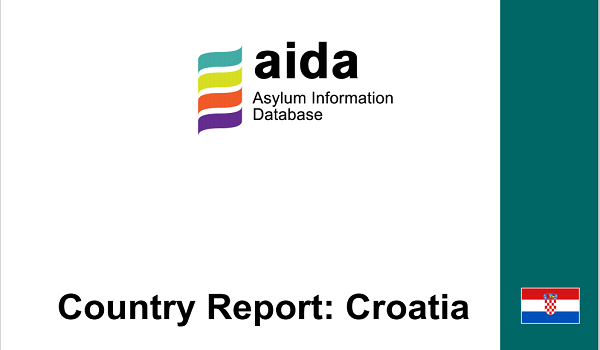The updated AIDA Country Report on Croatia provides a detailed overview on legislative and practice-related developments in asylum procedures, reception conditions, detention of asylum seekers and content of international protection in 2020. It shows that Croatia continues to be mainly a transit country and provides information on the serious human rights violations occurring at the border.
Access to the territory and to the international protection procedure remained a significant concern in 2020. The AIDA report documents information on pushback practices as reported by testimonies, NGOs, human rights bodies, UN bodies, media and other relevant actors scrutinising the situation at the border. According to the Danish Refugee Council (DRC) and UNHCR Serbia, at least 18,400 persons have been refused access to the territory, including vulnerable groups such as families and children. This refers to 16,425 pushbacks from Croatia to Bosnia and Herzegovina (BiH) and 1,975 pushbacks from Croatia to Serbia. In many cases these incidents raise serious concerns over the level of violence and the use of force by national law enforcement authorities.
The number of applicants for international protection in 2020 was slightly lower than in the previous year, decreasing from 1,986 applicants in 2019 to 1,932 in 2020. Although detailed statistics were not made available by national authorities, the recognition rate remained low in 2020, as only 42 persons were granted international protection. Moreover, 103 appeals out of 123 cases were rejected by the Administrative Court of Zagreb in 2020. The total number of pending cases at first and second instance reached 378 at the end of the year. However, it should be noted that more than 1,600 international protection procedures were suspended because the concerned person left the country, thereby indicating that Croatia is mainly a transit country.
In 2020 COVID-19 and a series of earthquakes impacted the work of authorities and organisations as well as the availability of services. Reception Centres for applicants of international protection were adapted to epidemiological measures. Throughout the year, a total of 1,348 applicants for international protection were subjected to self-isolation. According to the Ombudswoman for children, conditions in social welfare institutions do not meet the specific needs of unaccompanied children and do not provide adequate protection for children. However, an Ordinance on health care standards for applicants for international protection and foreigners under temporary protection entered into force. The Ordinance regulates the scope of health care for vulnerable applicants for international protection.
As regards detention, the Council of Europe Committee for the Prevention of Torture (CPT) visited a number of border police stations as well as the reception centre for foreigners (Ježevo) in Croatia to examine the detention conditions and pre-removal procedures in August 2020. According to the Croatian Ombudsperson, the report on the CPT visit was adopted in November 2020 and the Council of Europe (CoE) Commissioner for Human Rights urged Croatia to publish it. Yet, the report was still not publicly available as of April 2021.
Similarly to previous years, beneficiaries of international protection continued to face significant challenges in exercising their rights. The most important issues still relate to the language barrier, health care, employment, education and housing. Although the previous Integration Action Plan expired at the end of 2019, a new Integration Action Plan was still not adopted in 2020. COVID-19 further hampered the access to the labour market and to housing, thereby putting beneficiaries of international protection at risk of homelessness. A Working Group of the Permanent Commission for the Implementation of Integration of Foreigners in Croatian Society was established in 2020.
This article appeared in the ECRE Weekly Bulletin. You can subscribe to the Weekly Bulletin here.

